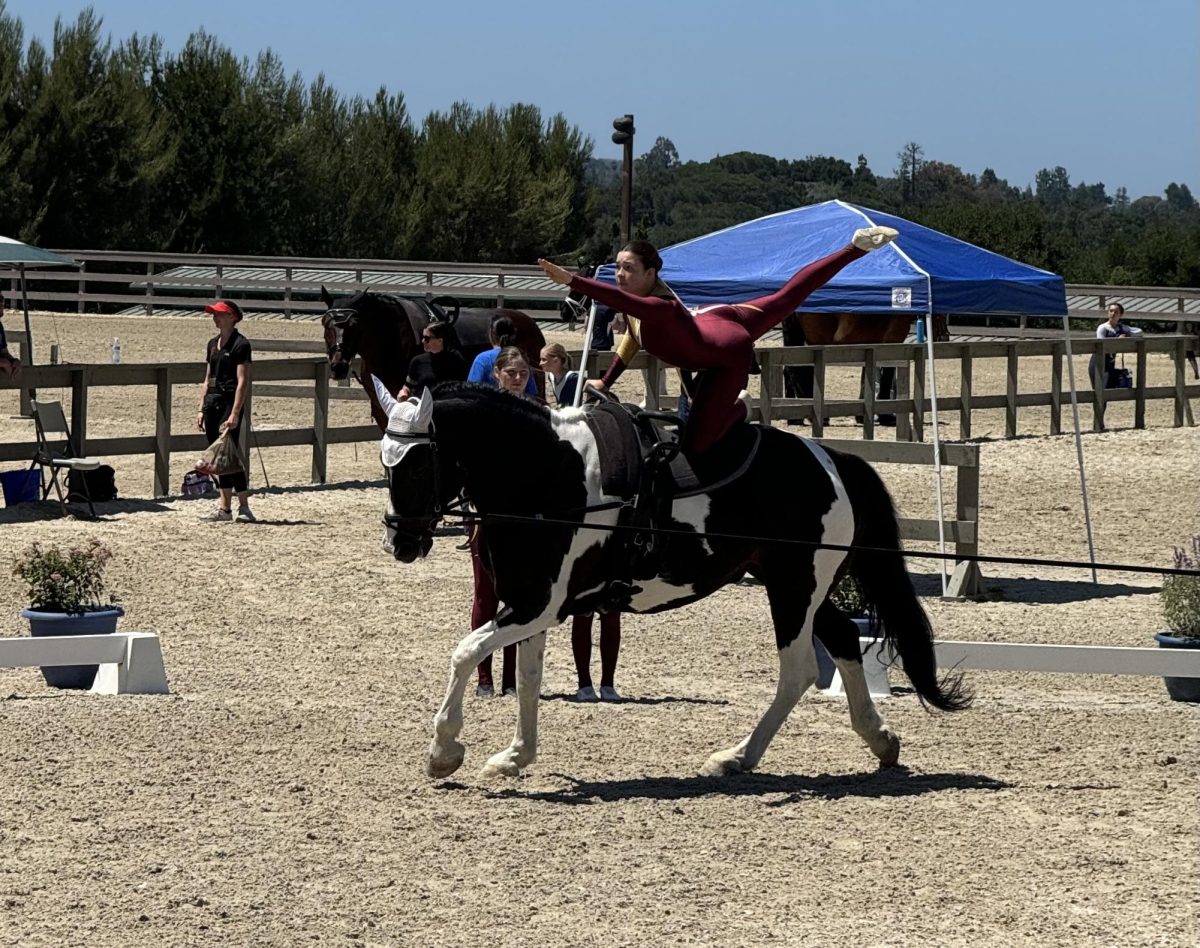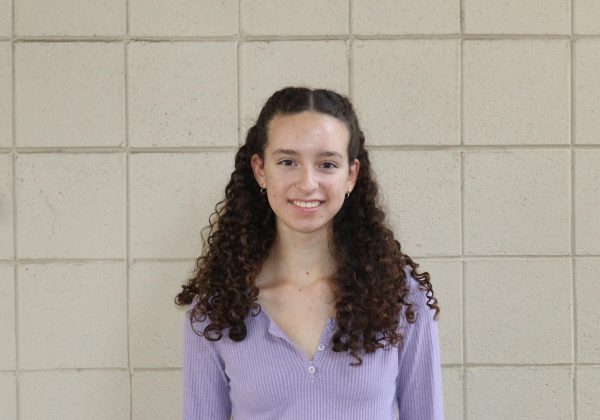When the final school bell rings for the day, sophomore Alice Vaughan’s immediate destination is usually to head up through Mount Eden Road in the hills above Saratoga to Garrod Farms, a family-owned 120-acre property that includes vineyards, a stable and an equestrian center.
Upon arrival, she cleans up the barn and then feeds and tends to her horse Mocha, a Welsh cop section D, before starting warm-ups. She stretches her legs, back and shoulders — muscles she specifically exerts while on her horse. Finally, she meets her five teammates near the barrel — a machine automated to mimic the pattern of a horse — and prepares to practice vaulting for the next two hours.
Advancing levels in vaulting, a sport where riders execute gymnastic moves on a moving horse, is dependent on consistent, high placement at competitions. Vaughan typically places in the top 10 of 20 at her competitions, with her strong performances ensuring she maintains her current level. This competitive nature of the sport can sometimes foster an unhealthy atmosphere, because, in team-based events, riders may judge one another for not meeting expected scores.
“It can be kind of a toxic environment, but I think that hanging out with my teammates and actually creating real bonds outside of our practices helps with that,” Vaughan said.
Vaughan has been vaulting for the last four years, ever since she attended a vaulting summer camp at Garrod Farms. With her previous five years of dance and gymnastics, she found that the sport came naturally to her. Vaughan’s interest in horses, however, sparked long before: The first book she ever read as a child was about horses, and she was immediately attracted to the animal’s appearance. Now that she vaults, she enjoys the opportunity to care for them.
Vaughan leases a horse at Garrod Farms, allowing her to use the horse whenever the owner is not. In addition to her vaulting training, she also works with her leased pony, Mocha, about four times a week recreationally.
“I practice other equestrian sports for fun on [Mocha] such as jump and dressage,” Vaughan said. “She is so sweet; I love her so much. Taking care of her is a lot of work, but it’s worth it.”
Last year, after a tryout in July where her coaches decided that Vaughan had improved enough to compete in the copper canter level, she increased to four hours a week of vaulting practice.
Canter is a more difficult pattern — where the horse moves in a three-beat stride — compared with the trot — which has a two-beat stride. In the copper level, the equestrian is judged in compulsory and freestyle.
Compulsories include the vault on, where the equestrian mounts the horse; gymnastics positions such as a handstand lasting four full strides; and a dismount, where she gracefully jumps off the horse.
In addition to these skills, Vaughan is judged on freestyle, which includes technique, artistry and “horse,” where “horse” means the horse’s quality of movement and appearance. Vaughan cleans her horse and practices often with Mocha to ensure they improve.
Vaughan competes in three main categories within her level: solo, duo and team. In her solo event, she competes to a song of her choice with skills personalized for her. In her duet, she competes on the same horse at the same time as her friend, while they follow the intricate choreography together. A duet can be more challenging than a solo because two people are balancing together. However, Vaughan loves rehearsing and bonding with her duet partner. She also competes in a team, where equestrians individually compete right after each other and their scores add up.
Courtesy of Alice Vaughan
Alice Vaughan mounts her horse, then balances while standing on the horse’s back.
Vaughan says she prioritizes vaulting in her schedule and occasionally struggles to manage both her sport and schoolwork. However, even though the sport requires her to dedicate nine hours each week to it, Vaughan loves the sport too much to quit.
“Vaulting is a form of physical exercise and I like to de-stress by exercising. It takes my mind off of stress and makes me feel calmer,” Vaughan said.
After putting Mocha back in her stall, Vaughan does conditioning for two hours. For Vaughan, conditioning means mastering her gymnastics skills and applying them to the horse — for instance: learning how to flip off of the horse. Vaughan prepares for her competitions by rehearsing her routines, both on and off her horse, until she feels confident and ready to compete.
Vaulting is a lesser known sport, but combines two of Vaughan’s favorite things: gymnastics and horses. Although she does not plan on pursuing vaulting beyond high school, she values the time she gets to spend vaulting for now.
“I love the sport, horses and people I get to spend time with,” Vaughan said.



























